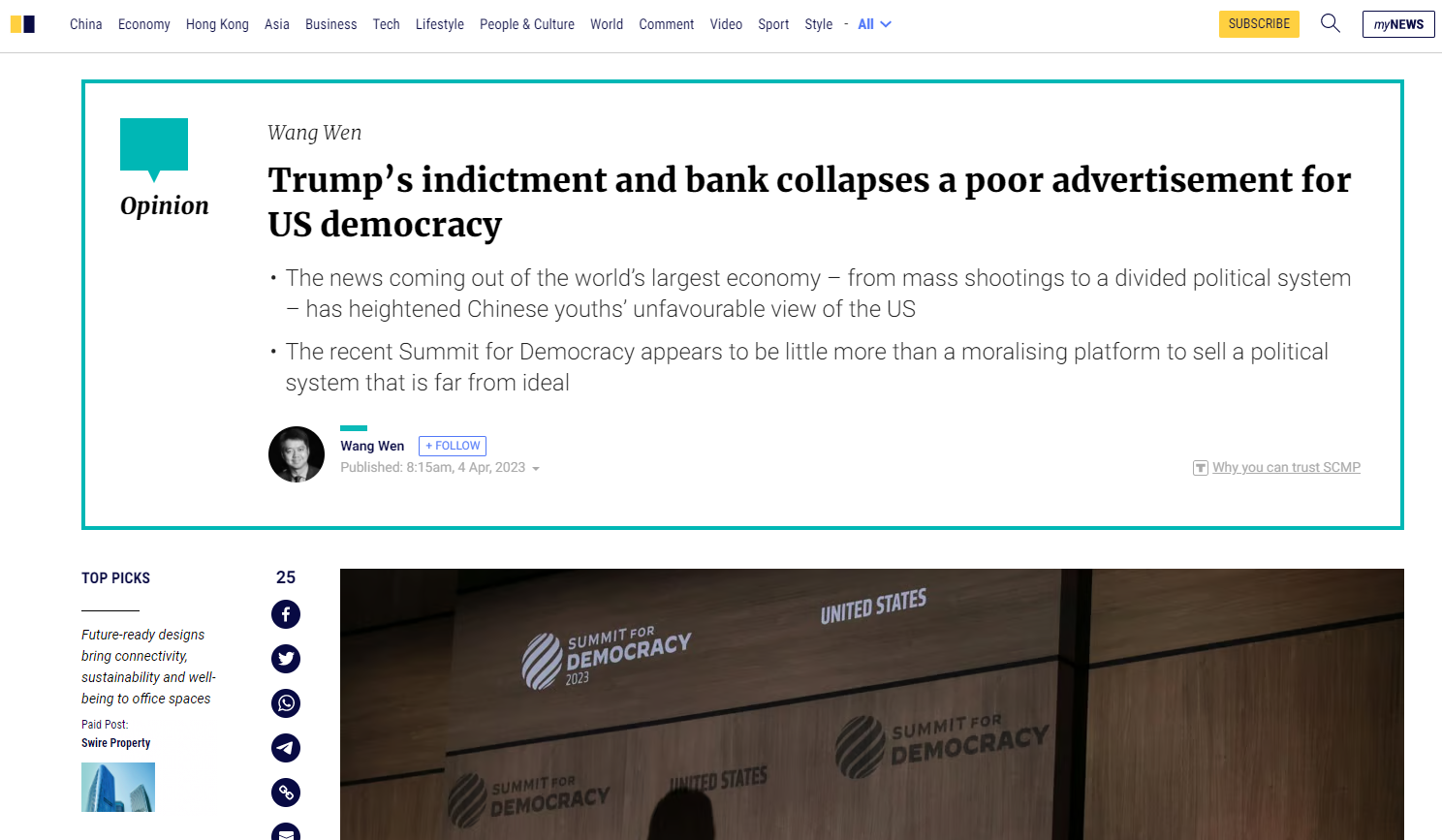LATEST INSIGHTS
Your Present Location: LATEST INSIGHTSWang Wen: Trump’s indictment and bank collapses a poor advertisement for US democracy
Source: South China Morning Post Published: 2023-04-04

The US staged the second Summit for Democracy last week. Chinese are chuckling at the irony as they await details of a criminal investigation into hush money paid on behalf of former US president Donald Trump before election day in 2016. The former American leader should also be ashamed of his role in the January 6 insurrection.
Chinese didn’t always feel the need, nor have the ammunition, to lampoon the US political system. However, the generation of young people who shouted “Long live President Wilson” at the end of World War I, and the idealistic generation who endorsed a “fight for freedom and democracy” in Tiananmen Square in 1989, have little in common with young Chinese people today who see no upside to emulating American democracy.
The many political, social and military misfortunes that have befallen the US this century have confused and outraged my students, even as they worry about the country that was once a source of envy.
Abraham Lincoln’s Gettysburg Address, declaring the ideal of a “a government of the people, by the people, for the people”, has long been a source of inspiration to Chinese scholars past and present. We now mourn this broken, unfulfilled American dream.
Chinese people still marvel at American technological innovation. Many of my students are fascinated by ChatGPT-4 and admire Tesla founder Elon Musk. Yet, it’s incomprehensible to them that a country with so much of everything has become so deeply divided at its core.
They see US democracy as being in a shambles as it can’t live up to a primary democratic principle: the peaceful transfer of power. They see elections won by staggering amounts money being used to sling hateful half-truths at opponents, and at China. They see US decision-making bodies gridlocked, their members defiant and angry.
Many Chinese people see the US preoccupation with fiery rhetoric as a roadblock to progress. In China, the freedom to say nasty things about one another is viewed not so much as a fundamental right, but as a way to lose face. Our freedom of discourse is dictated by decorum, not heightened emotion that dulls critical thinking.
There seems to be a fundamental hypocrisy in Americans championing freedom but curtailing women’s freedom to choose to end an unwanted pregnancy.
Then there are the more than 100 mass shootings already this year, police brutality against African-Americans, and the freedom of the “free press” to lie, provoke and spread rumours. Many Chinese can’t understand the righteous, science-denying extreme Christian religiosity in the US, and its divisive impact.
How is it possible that the world’s richest country records tens of thousands of “deaths of despair” due to suicide, drug overdose and alcoholic liver disease? My students might suggest the lack of caring inherent in capitalism brought the US to this point.
Surely, Americans see how the titans of industry are amassing profits during a health crisis, amid energy shortages and even war. Even as shareholders make hay, the elected leaders of the world’s wealthiest country can’t come together to provide affordable healthcare.
It seems that the takeover by the military-industrial complex that former president Dwight Eisenhower’s warned against has materialised. For all its moralising and chest-thumping about democracy, the US and its military have spent trillions of dollars on war.
Now the US banking system is once again in crisis mode. But this is unlikely to be a catalyst for new measures to narrow the wealth gap, which is crushing the American dream.
With all the trouble and strife in the US, it’s hard to understand how China has become the bogeyman. It feels like a ploy, one on which the US political right and left have found common ground.
The Eurasia Group Foundation’s fourth annual international public opinion survey found that the number of Chinese respondents who favour American-style democracy dropped from 44 per cent in 2019 to 32 per cent 2022. The number of Chinese respondents who strongly dislike American democracy more than doubled from 5 per cent in 2019 to 17 per cent in 2022.
Among my young students and contemporaries, very few would agree that American-style democracy should be the way forward for China.
Our criticism of American democracy doesn’t mean we think the Chinese system is flawless. We can see for ourselves the many challenges we haven’t yet overcome, and the deficiencies that need fixing. Chinese decision-makers and academics are constantly issuing warnings that high-quality development of Chinese democracy is required to improve quality of life and enhance people’s sense of security.
Yet, as we follow the developments in the US, we feel, not Schadenfreude, but pride in China’s achievements. Hundreds of millions have been lifted out of poverty and our cities are safe. Air quality has improved. Trust in our financial system has all but done away with paper money, as everyone uses e-payment apps on their phones.
From our perspective, the US’ Summit for Democracy is little more than a moralising platform to push flawed American values and sell the US political system as the only valid one. It’s clear intention is to ostracise China, and drive a deeper wedge between our two countries.
We can only hope the US will someday compose itself and learn to respect others.
Key Words: US, Summmit for Democracy, Wang Wen























































































 京公网安备 11010802037854号
京公网安备 11010802037854号





